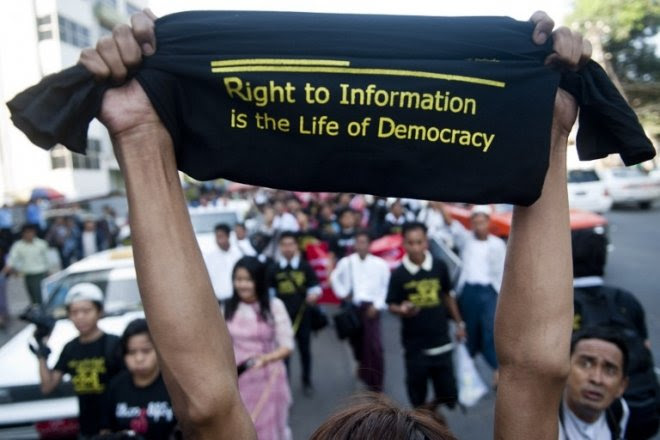Myanmar achieved notable improvements in some sectors during 2013, but serious problems remain throughout the country, says Human Rights Watch.
The assessment is included in the New York-based organization’s annual report for 2014 of the human rights situation in countries throughout the world last year.

Much of the report on Myanmar was devoted to violence against Muslims, laws on basic freedoms and ethnic conflict and displacement.
Describing the reform process as “uneven”, HRW said basic freedoms of assembly and association improved during 2013 but laws were enforced inconsistently.
“In several instances peaceful demonstrators still faced arrest,” it said.
“Media freedoms continued to flourish in 2013, but at the time of writing the government was seeking new laws that could roll back important recent gains.”
The report said more than 200 political prisoners were released in amnesties during 2013, but new arrests of political activists continued to be reported.
The report noted that communal violence had spread throughout the country last year, and said the situation of the displaced Rohingya Muslim minority in Rakhine State “remained precarious”.
It described conditions in some of the camps holding those displaced by violence as “deplorable”.
“While more international assistance reached them [camp residents] in 2013 than in 2012, serious concerns remain over restrictions on movement, lack of livelihoods, inadequate basic services and continued threats from Arakanese,” it said.
“The government continues to refuse to amend Burma’s draconian 1982 Citizenship Law that effectively denies citizens to Rohingya, despite many families having lived in Burma for generations.”
On laws concerning basic freedoms, the report said the legislative reform process remained opaque and consultation with key community groups was uneven.
It said the Law on Peaceful Assembly and Peaceful Processions was applied haphazardly, with the authorities permitting some demonstrations and refusing permission for others.
Concern was expressed about a draft Association Law released in August because of its potential to restrict the right to freedom of association.
HRW noted that while the media continued to flourish, the government had pressed forward with proposed new laws such as the draft Printers and Publishers Act “that, if passed, would significantly curtail media freedom”.
The report said serious human rights violations had occurred in ethnic minority areas last year.
It said humanitarian access to those displaced by fighting in ethnic areas had been uneven and insufficient, “with some local Burmese army commanders denying access that national-level authorities previously granted”.
On Myanmar’s relationship with the international community, the report said re-engagement had continued through expanded programs with the World Bank and Asian Development Bank and there had been marked increases in humanitarian and development assistance from the United States, the European Union, Britain, Australia and Japan.
It said the government had repeatedly blocked attempts to open an office in Myanmar of the United Nations High Commissioner for Human Rights.


